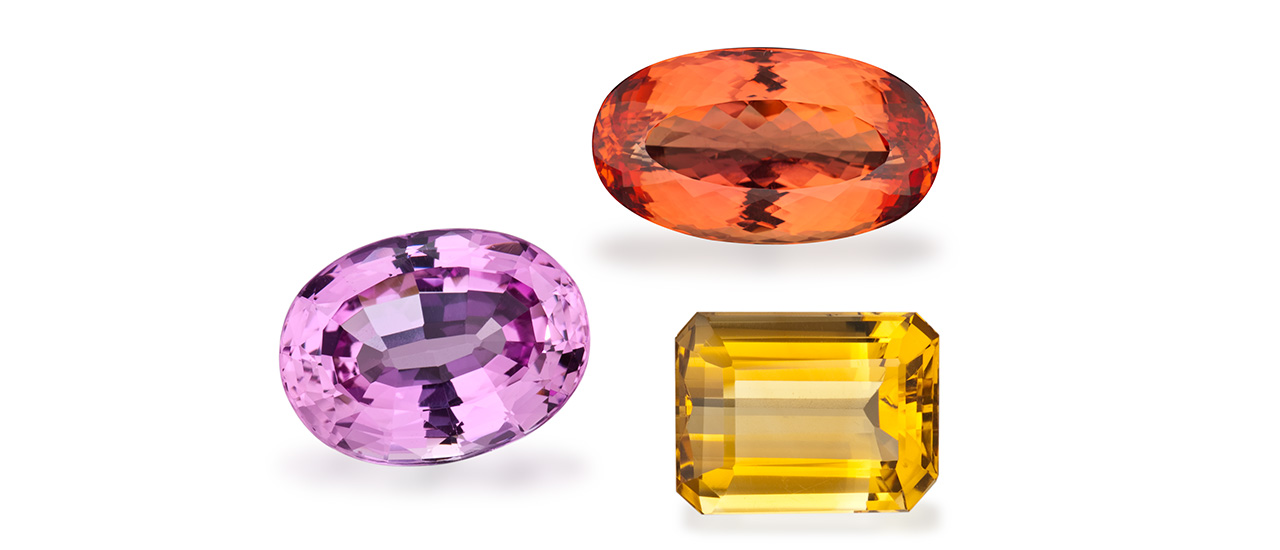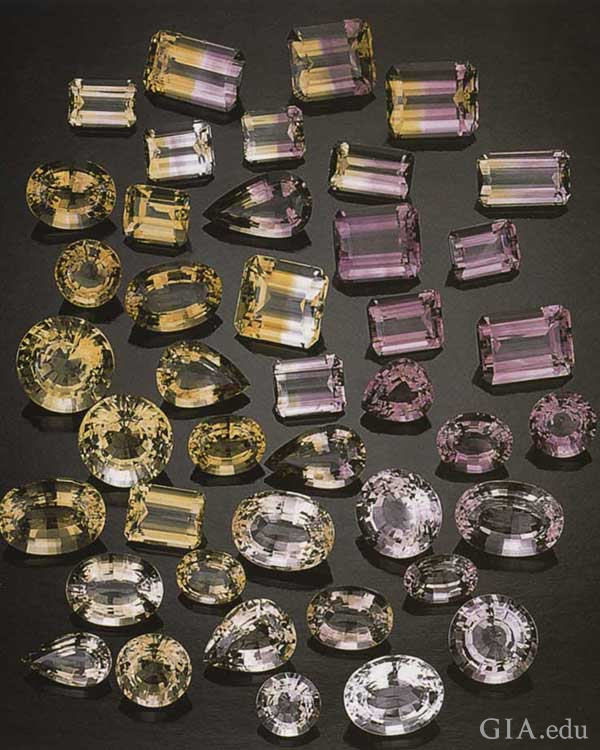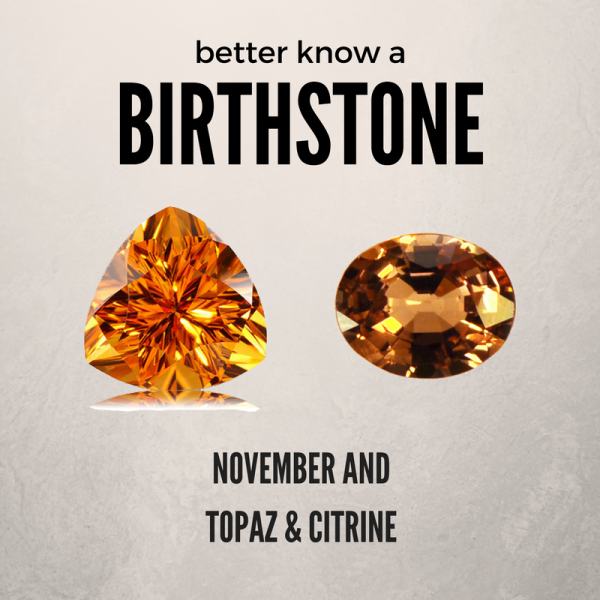
Those with November birthdays have two beautiful birthstones to choose from: topaz and citrine. Topaz comes in a rainbow of colors; citrine is prized for its charming yellow and orange hues. Both November birthstones are known to have calming energies while bringing fortune and warmth to the wearer. Most topaz and citrine birthstones are affordably priced, as good-quality gems are not as rare as for many of their counterparts. This means that those born in November have many options to choose from. Your challenge will be deciding which one to pick.
TOPAZ BIRTHSTONE
TOPAZ BIRTHSTONE MEANING & HISTORY
The variety of topaz hues includes colorless, light blue, yellow, orange, pink, violet, brown, and, very rarely, red. The vast majority of blue topaz seen today is the permanent result of treating colorless topaz with irradiation and heating. The rainbow effect seen in “Mystic Topaz” is created by coating colorless topaz with a thin artificial film.
Some believe the word “topaz” comes from the Sanskrit word tapas, which means “fire.” Others trace it back to the Greek topazos. This November birthstone was long thought to have many benefits. The ancient Greeks believed that topaz gave them strength. From the 1300s to the 1600s, Europeans thought it could thwart magic spells and dispel anger. For centuries, many people in India have believed that topaz worn above the heart assures long life, beauty, and intelligence.
The distinctly pinkish-orange Imperial topaz has aristocratic cachet. It is commonly believed that the name originated with the Russian royal family’s insistence on keeping the finest colors of this gem, which was mined in Russia’s Ural Mountains, exclusively for their use. An alternate explanation, especially popular in Brazil, is that it dates from an 1881 visit by Brazilian Emperor Pedro II to Ouro Preto—the town closest to Brazil’s most productive topaz mines–and the gift of a reddish topaz to him.
Blue topaz is the gem of the fourth wedding anniversary, and Imperial topaz is the gem of the 23rd wedding anniversary.
WHERE IS TOPAZ FOUND?
Minas Gerais, a state in Brazil, is one of the most important sources for high-quality topaz, which has been mined there for more than two centuries. Yellow to orange, red, pink, violet, and blends of red with orange or purple are some of the colors unearthed here. The nearby town of Ouro Preto is a fitting companion. In this UNESCO world heritage site, majestic colonial churches checker the skyline and quaint cobblestone streets crisscross the city.
Northwestern Pakistan is known for producing pink topaz. Ghundao Hill, close to the small town of Katlang, has been mined since 1972. The most sought-after shade of pink topaz from Katlang has a tinge of violet, which some in the gem trade call cyclamen pink. But even at Ghundao Hill, only rarely is this fine pink November birthstone found.
Today, other major sources of this November birthstone include Namibia, Nigeria, Madagascar, Mexico, Myanmar, Sri Lanka and the United States, as well as the historic Russian localities.
TOPAZ BIRTHSTONE CARE & CLEANING
Topaz is an 8 on the Mohs scale of hardness, but it has poor toughness, so care is required to avoid chipping or cracking. To clean this November birthstone, do not use steam cleaning or ultrasonic cleaners. Warm, soapy water works best. High heat or sudden temperature changes can cause internal breaks in topaz. The birthstone’s color is generally stable to light, but prolonged exposure to heat or sunlight might cause fading in some yellow-to-brown gems. Topaz may be affected slightly by some chemicals.
The coating on Mystic Topaz can withstand normal wear, but abrasive cleaners or buffing wheels will remove it. Only a mild soap solution should be used to clean a topaz birthstone treated in this manner.
CITRINE BIRTHSTONE
CITRINE BIRTHSTONE MEANING & HISTORY
This November birthstone is the transparent yellow to brownish orange variety of quartz, which has been used in jewelry for thousands of years. Citrine has been a popular gemstone since ancient times and has shared a history of mistaken identities with the other November birthstone, topaz. As a result, people thought citrine had the same powers as topaz. They believed the citrine birthstone could soothe tempers and calm the wearer.
The ancient Greeks carved rock crystal ornaments that glistened like permafrost. Roman pontiffs wore rings set with massive purple amethysts, and citrine has been reported in Roman jewelry. It was particularly popular in colorful Scottish jewelry from the Victorian era. Citrine, believed to derive from the French word for “lemon” (citron), is given for the thirteenth wedding anniversary.
Today, most of the citrine in the marketplace results from the heat treatment of amethyst. With its ready availability in a broad range of sizes, a citrine birthstone is one of the most affordable and desired yellow gemstones.
WHERE IS CITRINE FOUND?
The top sources for this November birthstone are Bolivia, Spain, Madagascar, Mexico, and Uruguay. Amethyst that’s typically heat-treated to a citrine color is mined mostly in Brazil.
Deep in the world’s largest freshwater wetland lies Bolivia’s Anahí mine, an important source for natural, unheated citrine. Fields of wildflowers, brightly plumed birds, kaleidoscopes of butterflies, Howler monkeys and jaguars are some of the actors on this vast stage. The story of the mine is worthy of the setting. Discovered by a Spanish conquistador in the 1600s, it was given to him as a dowry when he married Anahí, a princess from the Ayoreos tribe of Paraguay. The mine was lost for three centuries until it was rediscovered in the 1960s.
The Anahí mine produces a unique combination of amethyst and citrine in the same crystal; when the two colors appear together in a fashioned gem, it is known as ametrine. The citrine birthstones produced at the Anahí mine typically range from orange-yellow to brownish/greenish-yellow.

CITRINE BIRTHSTONE CARE & CLEANING
At 7 on the Mohs scale of hardness with good toughness, your citrine birthstone is usually durable enough for normal wear and care. It can be safely cleaned with warm, soapy water. While it is usually okay to clean your November birthstone in an ultrasonic machine, steam cleaning is risky since high heat could cause the stone to crack.
Now that you know a little bit more about the history of these two November birthstones and where they can be found, you just might be inspired to add them to your collection! Having topaz and citrine as your November birthstones gives you numerous choices, as they offer eye-catching colors and sizes. You’ll find our Topaz Buying Guide and Citrine Buying Guide to be extremely helpful when looking for a November birthstone for yourself or a loved one.
Source: https://www.gia.edu/birthstones/november-birthstones

